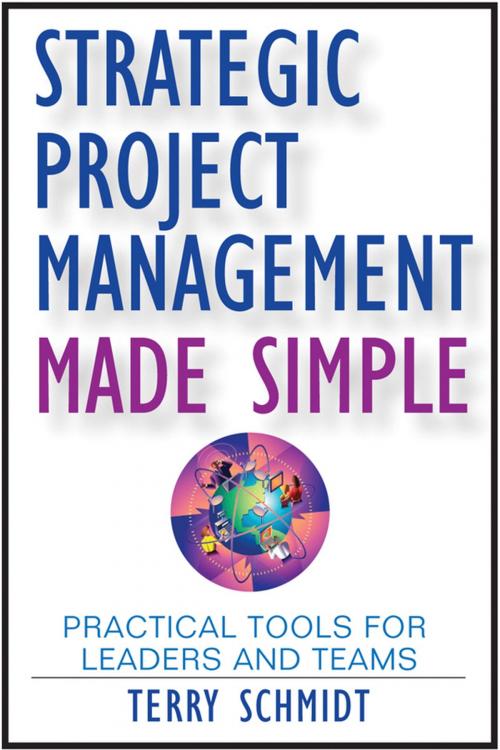Strategic Project Management Made Simple
Practical Tools for Leaders and Teams
Business & Finance, Management & Leadership, Management| Author: | Terry Schmidt | ISBN: | 9780470442937 |
| Publisher: | Wiley | Publication: | March 16, 2009 |
| Imprint: | Wiley | Language: | English |
| Author: | Terry Schmidt |
| ISBN: | 9780470442937 |
| Publisher: | Wiley |
| Publication: | March 16, 2009 |
| Imprint: | Wiley |
| Language: | English |
When Fortune Magazine estimated that 70% of all strategies fail, it also noted that most of these strategies were basically sound, but could not be executed. The central premise of Strategic Project Management Made Simple is that most projects and strategies never get off the ground because of adhoc, haphazard, and obsolete methods used to turn their ideas into coherent and actionable plans. Strategic Project Management Made Simple is the first book to couple a step-by-step process with an interactive thinking tool that takes a strategic approach to designing projects and action initiatives. Strategic Project Management Made Simple builds a solid platform upon four critical questions that are vital for teams to intelligently answer in order to create their own strong, strategic foundation. These questions are:
-
What are we trying to accomplish and why?
-
How will we measure success?
-
What other conditions must exist?
-
How do we get there?
This fresh approach begins with clearly understanding the what and why of a project - comprehending the bigger picture goals that are often given only lip service or cursory reviews. The second and third questions clarify success measures and identify the risky assumptions that can later cause pain if not spotted early. The how questions - what are the activities, budgets, and schedules - comes last in our four-question system. By contrast, most project approaches prematurely concentrate on the how without first adequately addressing the three other questions. These four questions guide readers into fleshing out a simple, yet sophisticated, mental workbench called "the Logical Framework" - a Systems Thinking paradigm that lays out one's own project strategy in an easily accessible, interactive 4x4 matrix. The inclusion of memorable features and concepts (four critical questions, LogFrame matrix, If-then thinking, and Implementation Equation) make this book unique.
When Fortune Magazine estimated that 70% of all strategies fail, it also noted that most of these strategies were basically sound, but could not be executed. The central premise of Strategic Project Management Made Simple is that most projects and strategies never get off the ground because of adhoc, haphazard, and obsolete methods used to turn their ideas into coherent and actionable plans. Strategic Project Management Made Simple is the first book to couple a step-by-step process with an interactive thinking tool that takes a strategic approach to designing projects and action initiatives. Strategic Project Management Made Simple builds a solid platform upon four critical questions that are vital for teams to intelligently answer in order to create their own strong, strategic foundation. These questions are:
-
What are we trying to accomplish and why?
-
How will we measure success?
-
What other conditions must exist?
-
How do we get there?
This fresh approach begins with clearly understanding the what and why of a project - comprehending the bigger picture goals that are often given only lip service or cursory reviews. The second and third questions clarify success measures and identify the risky assumptions that can later cause pain if not spotted early. The how questions - what are the activities, budgets, and schedules - comes last in our four-question system. By contrast, most project approaches prematurely concentrate on the how without first adequately addressing the three other questions. These four questions guide readers into fleshing out a simple, yet sophisticated, mental workbench called "the Logical Framework" - a Systems Thinking paradigm that lays out one's own project strategy in an easily accessible, interactive 4x4 matrix. The inclusion of memorable features and concepts (four critical questions, LogFrame matrix, If-then thinking, and Implementation Equation) make this book unique.















